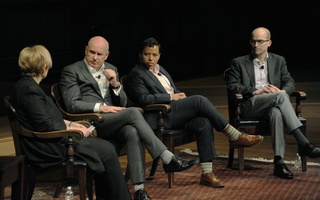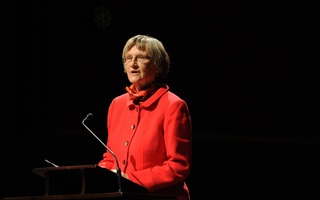{shortcode-f1416179960e890f09ed8077554cc87cb1f7cfdd}
Students stood vigil Tuesday night at the steps of Harvard’s Memorial Church in solidarity with those affected by President Donald Trump’s latest immigration restrictions.
Around 100 protesters, mostly undergraduates, attended the vigil, which began with a sunset prayer led by Harvard Muslim Chaplain Khalil Abdur-Rashid. Harvard’s Anti-Islamophobia Network organized the event, which featured speeches from the Chaplain and from undergraduate students directly and indirectly affected by the ban.
Anwar B. Omeish ’19, director of external relations of the Harvard Islamic Society, said she helped organize the event because “we wanted to create a sense of solidarity and...keep the conversation about this going.” Omeish expressed concern that each successive “Muslim ban” has received less media attention and concerted resistance than the last.
The AIN, an offshoot of the Harvard Islamic Society, was formed in response to Trump’s initial executive order restricting travel from several Muslim-majority nations in January 2017, and has been organizing protests and coordinating with local government. The network billed Tuesday’s vigil as “Establishing Justice: Prayer & Vigil Against Muslim Ban 3.0.” HIS president Zarin I. Rahman ’18 said she hoped it could provide “a space to mourn, to learn, and to know small things that [attendees] can do moving forward that can help eliminate the larger problem.”
The event formed in response to Trump’s proclamation on Sept. 24 which aimed to indefinitely ban immigrants and refugees from Chad, Iran, Libya, Somalia, Syria, Yemen, North Korea and Venezuela, the third iteration of a policy that vigil speakers referred to as a “Muslim ban.”
Federal Judge Derrick K. Watson ’88 temporarily blocked the policy for the six Muslim-majority countries on that list Tuesday afternoon. While vigil speakers expressed relief and gratitude for Watson’s decision Tuesday, they said it was not enough.
“Waiting for judges to block executive orders is not a sustainable way to live...we’re going to keep going until there’s no Muslim ban ever, and I’m going to keep going until there are no policies that target Muslim communities, or any other communities, for that matter,” Omeish said.
Abdur-Rashid echoed Omeish’s sentiment.
“[The Muslim prayer] begins with standing, and it ends with sitting, to symbolize the idea that when you enter life, when you devote yourself to a particular direction, you must be very vigilant. You must stand. You must be active, and pro-active, in making sure that violence and injustice does not prevail, that oppression does not prevail, that harm does not prevail,” Harvard Islamic Chaplain Khalil Abdur-Rashid said. “And then we bow ... as if we’re going to rest, but then we rise again, to remind us that you should not only stand once, but you should be standing repeatedly.”
Read more in News
‘Classroom to Table’ Program Returns for a Third YearRecommended Articles
-
 Thousands Protest Immigration Order in Boston
Thousands Protest Immigration Order in Boston -
 At Panel, Journalists Debate Future of Media
At Panel, Journalists Debate Future of Media -
Muslim Student Groups Host Vigil At Memorial ChurchAround 100 students gathered Wednesday night for a candlelight vigil in response to a series of hate crimes against Muslims and President Donald Trump’s recent executive order.
-
 News Analysis: In the Age of Trump, Faust Treads Cautiously
News Analysis: In the Age of Trump, Faust Treads Cautiously -
 Faust Met with Paul Ryan, Other Legislators on D.C. Trip
Faust Met with Paul Ryan, Other Legislators on D.C. Trip













